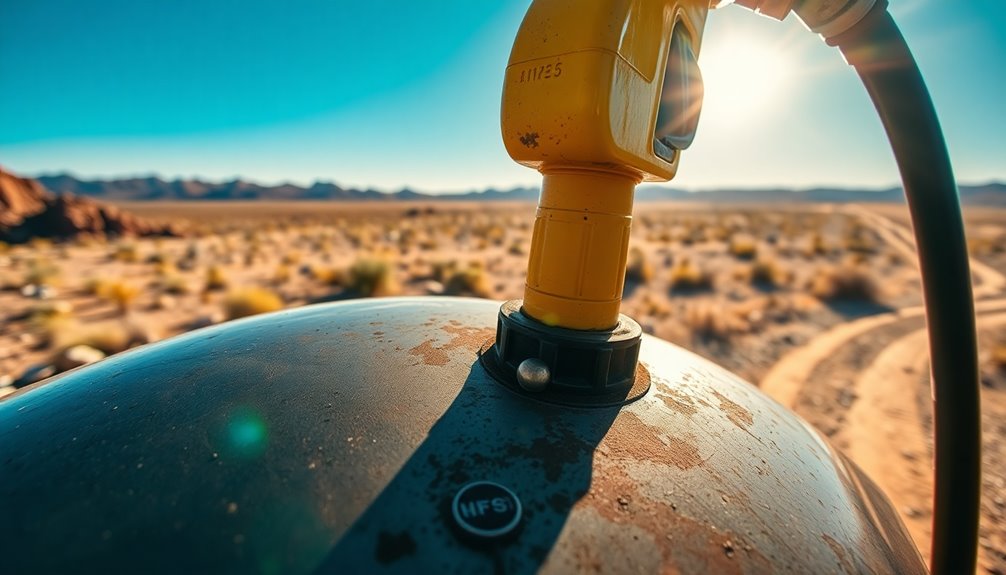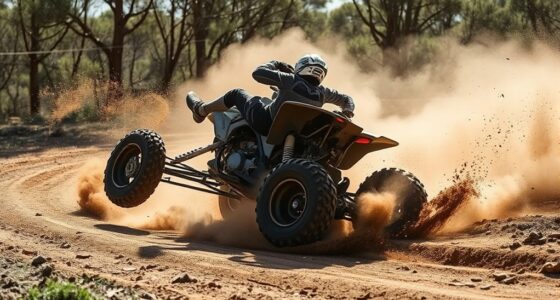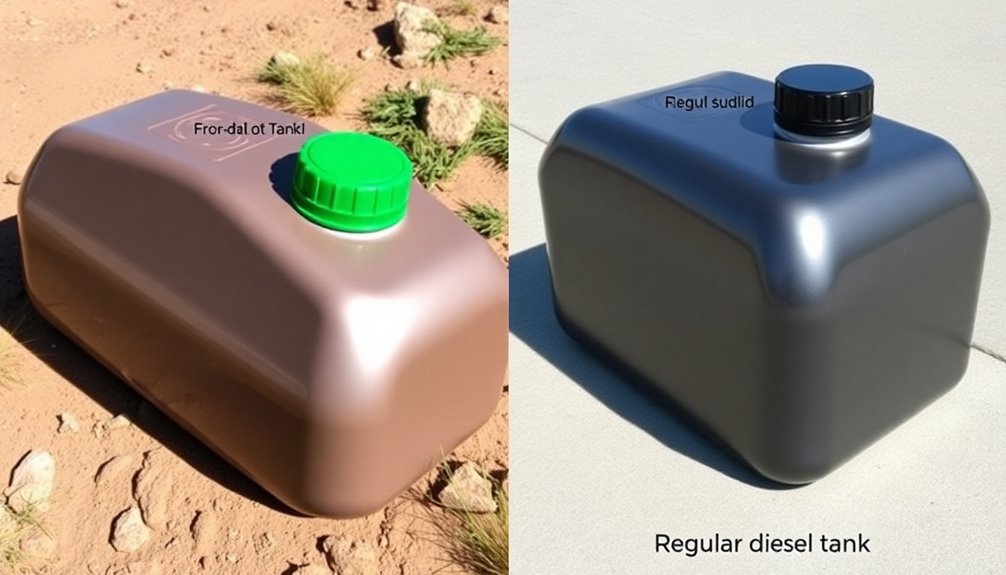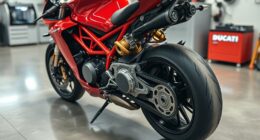To protect your off-road racing investments, make certain you have complete insurance covering vehicle damage, theft, and equipment loss during transport and storage. It’s crucial to include liability and personal injury coverage to shield you from legal and medical costs. Consider specialized policies for race events and understand your policy limits and exclusions to avoid surprises. Proper coverage can minimize downtime and out-of-pocket expenses—keep exploring to learn how to optimize your insurance strategy for competition.
Key Takeaways
- Ensure comprehensive coverage for vehicle damage, theft, and equipment loss, including high-cost parts and accessories.
- Regularly review policy limits, deductibles, and exclusions to prevent gaps during race-related incidents.
- Obtain specialized policies that cover race-specific risks like track damage, event cancellations, and liability.
- Verify that liability and personal injury protections extend to all event types and terrains involved in racing.
- Choose insurers with strong reputations for reliable service and customize coverage to match evolving racing activities.
Assessing Coverage Needs for Off-Road Vehicles and Equipment
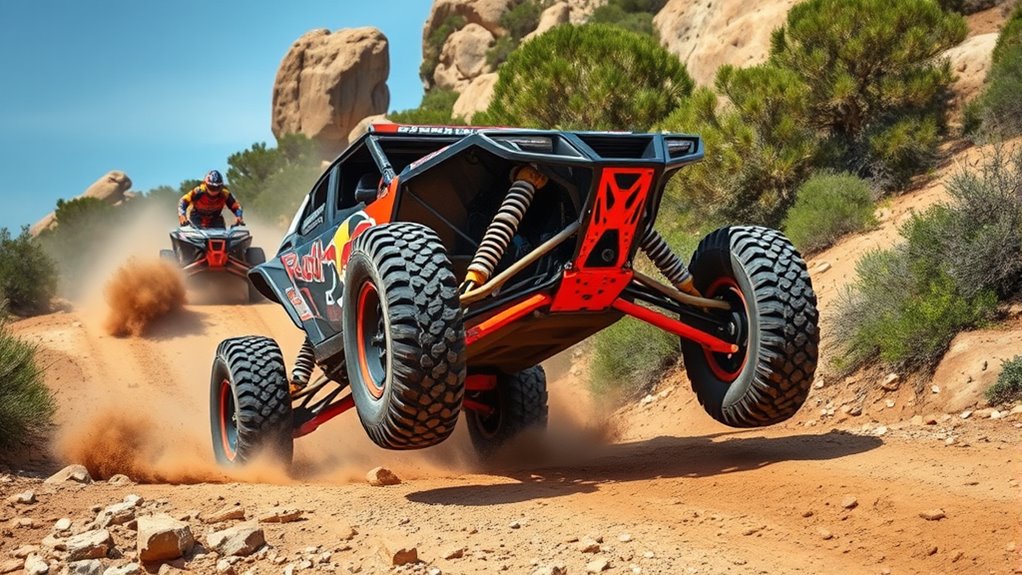
When evaluating your coverage needs for off-road vehicles and equipment, it’s essential to understand the unique risks involved in off-road racing. These risks include vehicle damage from crashes, rollovers, and rough terrain, as well as theft or vandalism when your equipment is stored or transported. You need policies that cover repair costs, replacement, and possibly equipment loss. Consider insuring your vehicle’s parts, accessories, and spare equipment separately, as they can be costly to replace. Also, review coverage limits and deductibles carefully to ensure you’re protected without overpaying. Keep detailed records of your gear and vehicle specifications, so you can easily update your policy as your equipment evolves. Proper assessment ensures you’re financially prepared for the unpredictable nature of off-road racing. Utilizing specialized insurance policies designed for off-road racing can further enhance your coverage options and provide peace of mind.
Understanding Liability and Personal Injury Protections
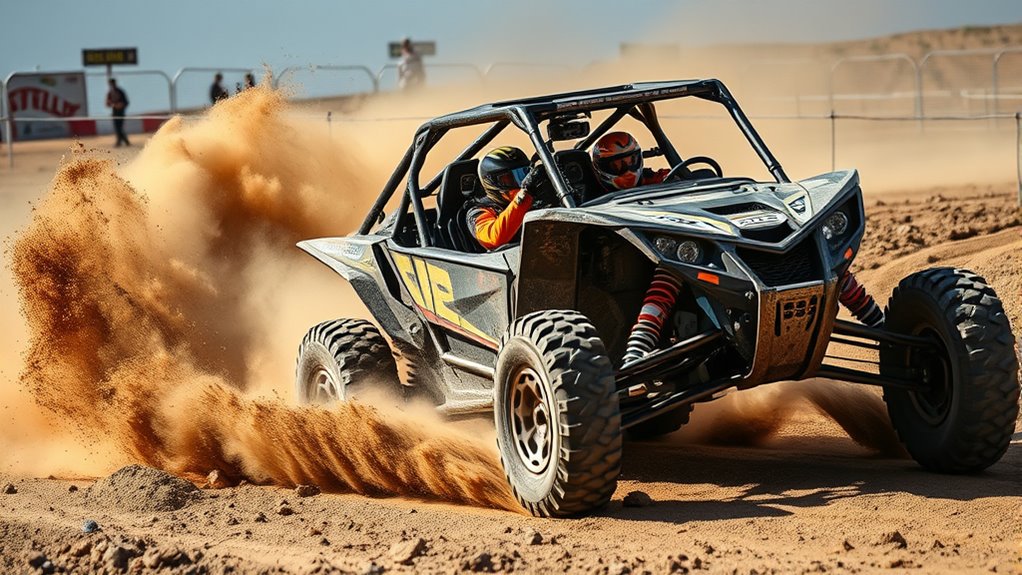
Have you considered how liability and personal injury protections can impact your racing experience? These coverages are vital because accidents can happen anytime, and injuries can be costly. Liability insurance protects you if you’re responsible for damage or injuries to others, covering legal fees and damages. Personal injury protection (PIP), on the other hand, covers your medical expenses regardless of fault, guaranteeing you get prompt treatment. Without these protections, you risk significant out-of-pocket costs and legal complications. Understanding what’s included in your policies helps you make informed decisions and provides peace of mind when you’re pushing your limits on the track. It’s essential to review your coverage regularly to ensure it aligns with your racing activities and potential risks. Additionally, staying informed about AI safety measures can help you anticipate and mitigate emerging risks related to new technologies in racing.
Specialty Policies for Race Events and Competition-Specific Coverage
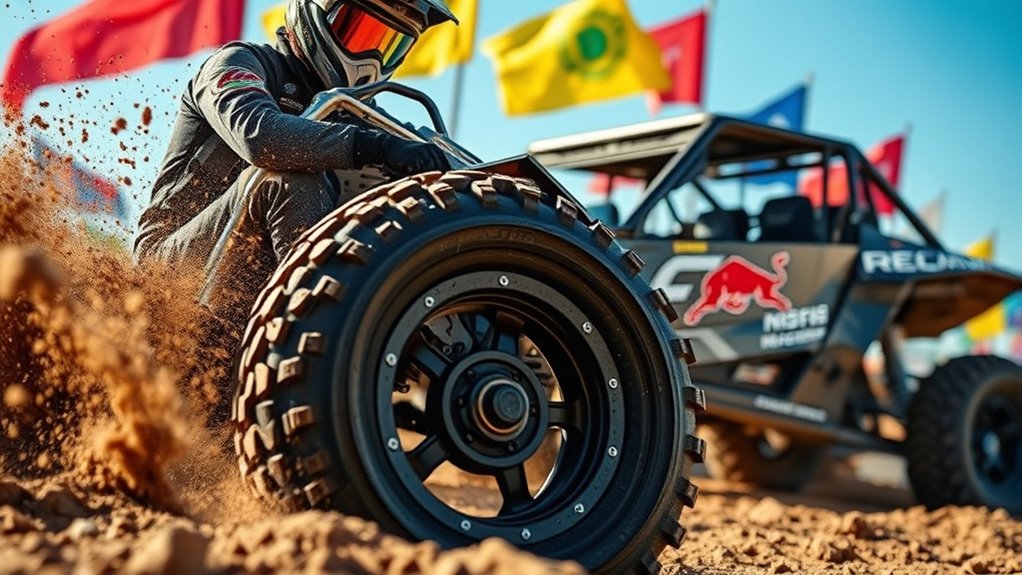
To guarantee you’re fully protected during race events, specialized policies tailored to competition-specific risks are essential. These policies address unique hazards like track damage, event cancellations, and medical emergencies that standard policies might overlook. Understanding chemical safety is crucial, especially when handling any hazardous materials involved in vehicle maintenance or repair. By securing race-specific coverage, you ensure that any accidents or incidents directly related to your participation are covered without exhausting your personal limits. Many providers offer event-specific policies that include coverage for equipment damage, liability during the event, and even coverage for third-party injuries. This targeted protection allows you to focus on racing with peace of mind, knowing that unexpected costs won’t derail your season. Investing in these specialty policies helps you manage risks unique to your sport, ensuring you’re covered when it matters most.
Addressing Property Damage and Loss of Use Risks

Property damage coverage is essential to safeguard your race vehicle and other assets from costly accidents. You need to guarantee you can recover losses quickly to stay competitive. Let’s explore how proper insurance can address these risks effectively. Incorporating the best anime movies into your knowledge base can also provide entertainment and inspiration during downtime.
Property Damage Coverage
Are you prepared for the financial impact of property damage or lost use during a race? Without proper coverage, a single accident can cost thousands. To protect yourself, consider these key points:
- Coverage for race vehicles and equipment to replace or repair damages quickly.
- Loss of use coverage, which helps cover income if your vehicle is sidelined.
- Property damage liability, protecting against third-party claims if you damage someone else’s property.
- Utilizing specialized race-specific insurance policies can provide tailored protection that standard policies may lack.
Having extensive property damage coverage ensures you’re financially protected from the unexpected. It minimizes out-of-pocket expenses and keeps you focused on racing rather than the financial fallout. Make sure your policy matches your racing activities and equipment value to avoid gaps in protection. Proper coverage is essential for maintaining peace of mind during your competitive season.
Protecting Race Vehicles
Protecting your race vehicles from damage and loss of use is essential to maintaining your competitive edge. You need insurance coverage that addresses not only repairs but also the financial impact of being sidelined. Extensive property damage coverage helps repair or replace your vehicle after accidents, reducing out-of-pocket costs. Consider policies that include coverage for parts and equipment specific to your vehicle, as repairs can be costly. Loss of use coverage is equally important, compensating you for income lost while your vehicle is out of commission. Proper protection minimizes downtime and keeps you racing. Regular maintenance and secure storage also play a role in reducing risks. Incorporating rustic decor elements and maintaining a well-organized space can help prevent damage to your equipment and accessories. By proactively safeguarding your assets, you ensure you’re prepared for unforeseen setbacks and can focus on winning races.
Recovery of Losses
When your off-road race vehicle sustains damage or is sidelined, recovering your losses quickly becomes essential to maintaining your competitive edge. Proper insurance coverage helps you address property damage and minimize downtime. Here are three key steps to guarantee a swift recovery: 1. Assess and document the damage promptly to support your insurance claim and prevent disputes. 2. Understand your policy’s coverage limits and exclusions** so you know what costs are covered and plan accordingly. 3. Arrange for quick repairs or replacements** through trusted vendors to get back on the track faster. Additionally, choosing specialized planters designed for durability and quick maintenance can be beneficial when setting up a backup vehicle or repair station.
Navigating Insurance Exclusions and Policy Limitations
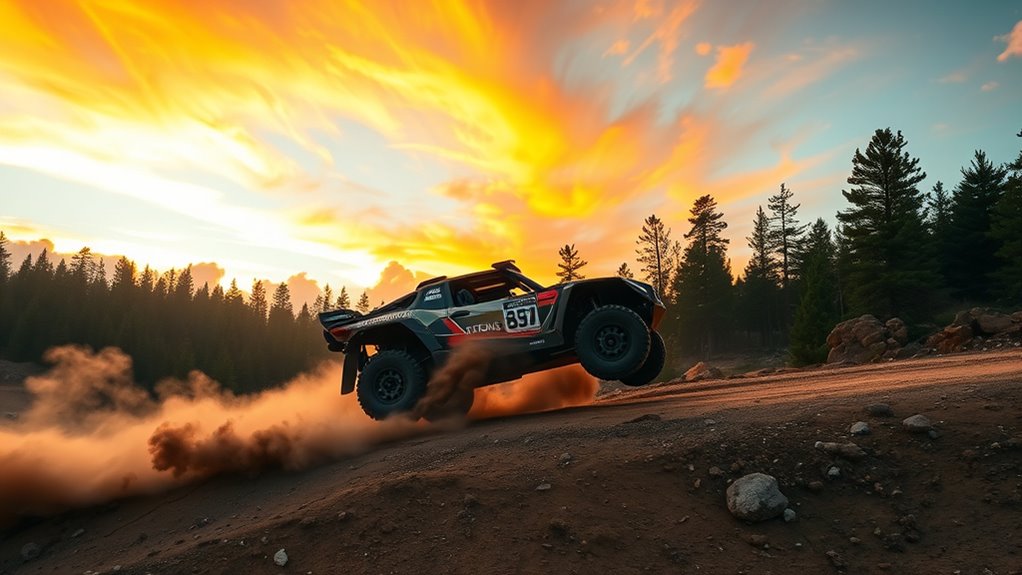
Understanding your insurance policy’s exclusions is vital to avoid surprises when you need coverage most. You should be aware of common exclusions and how they could limit your protection during races. Managing these gaps beforehand helps guarantee you’re better prepared for unexpected events on the track. Additionally, recognizing the importance of mental wellbeing can support resilience in high-pressure situations like competitions.
Common Policy Exclusions
Insurance policies for off-road racers often include specific exclusions that limit coverage in certain situations. Being aware of these exclusions helps you avoid surprises when filing claims. Common policy exclusions include:
- Intentional Damage: If you intentionally cause damage or participate in illegal activities, your coverage won’t apply.
- Pre-existing Conditions: Any damage resulting from issues that existed before your policy started won’t be covered.
- Race-Related Incidents: Some policies exclude coverage for accidents occurring during competitive racing, especially if racing outside sanctioned events.
Understanding these exclusions allows you to better assess your coverage and take steps to protect yourself in high-risk scenarios. Always review your policy carefully to ensure you’re aware of what’s covered and what’s not.
Managing Coverage Gaps
Understanding insurance exclusions and policy limitations is essential to avoid unexpected out-of-pocket expenses. Coverage gaps can leave you vulnerable during a race or training. To manage these gaps, review your policy carefully and ask your insurer about specific exclusions, such as coverage for certain terrains or vehicle modifications. Consider supplemental insurance options tailored for off-road racing to fill in these gaps. Here’s a quick guide:
| Coverage Aspect | Common Limitations | How to Manage |
|---|---|---|
| Race-related Damage | Excludes race incidents | Add race-specific coverage |
| Vehicle Modifications | Not covered if unlisted | Declare modifications early |
| Personal Injury | Limited medical coverage | Purchase supplemental health insurance |
| Liability | Excludes certain event types | Clarify coverage scope with insurer |
Staying informed helps you race confidently without financial surprises. Additionally, understanding the coverage scope of your policy can help prevent overlooked exclusions that might impact your racing activities.
Tips for Choosing the Right Insurer and Policy Terms
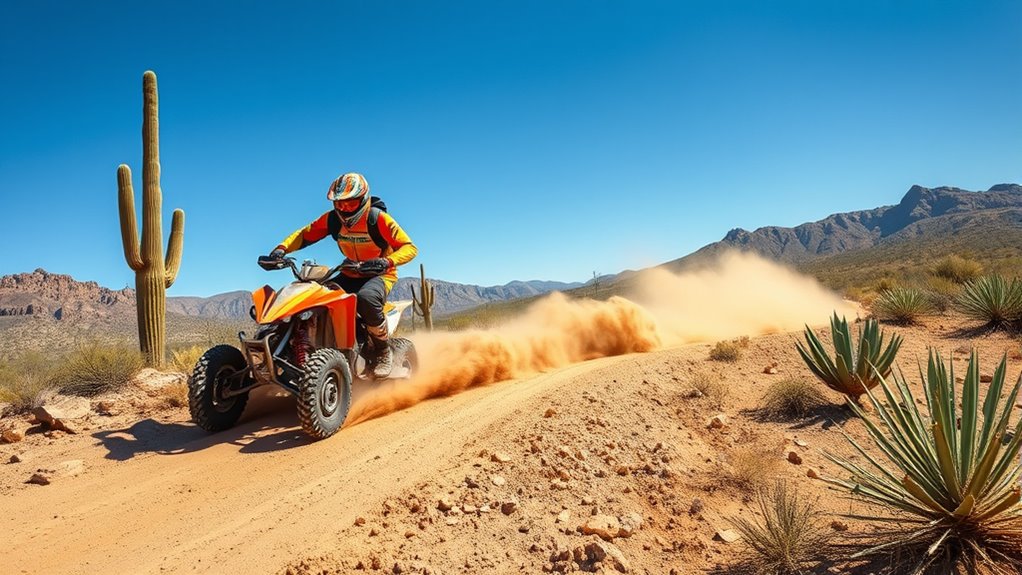
Choosing the right insurer and policy terms is essential to guarantee you’re adequately protected without overpaying. To do this, consider these key tips:
- Research the insurer’s reputation – Look for reviews and ask fellow racers about their experiences to ensure reliability and good customer service.
- Compare coverage options – Make sure the policy covers all critical risks, including race-specific scenarios, and check for add-ons or endorsements tailored to off-road racing.
- Assess policy flexibility and costs – Find a policy that offers flexible terms suited to your racing schedule and budget, avoiding overly restrictive or expensive plans.
- Evaluate the insurer’s customer support capabilities – Reliable support can be crucial during emergencies or claims, especially when dealing with specialized racing policies.
Frequently Asked Questions
How Do I Determine the Appropriate Insurance Limits for My Racing Activities?
To determine the right insurance limits for your racing activities, start by evaluating the value of your equipment and potential liabilities. Think about the types of races you’ll participate in and the risks involved. Consult with an experienced insurance agent who understands off-road racing. They can help you evaluate your coverage needs based on your budget and risk exposure, ensuring you’re protected without overpaying.
Are There Specific Insurers Specializing in Off-Road Racing Coverage?
Like finding a needle in a haystack, locating insurers specializing in off-road racing coverage can be tricky. You should research niche providers who focus on motorsports or off-road activities. Contact racing associations for recommendations, and ask about policies tailored for off-road racing. Comparing quotes and coverage options helps guarantee you find a company that understands your risks and offers the protection you need, just like a reliable safety net.
What Is the Process for Filing a Claim After an Accident During a Race?
When you have an accident during a race, you should immediately guarantee everyone’s safety and gather evidence like photos and witness statements. Next, contact your insurer promptly, providing details of the incident and documentation. Fill out any required claim forms accurately, and stay in touch with your claims adjuster. Following these steps helps expedite the process, so you can focus on recovery and getting back on the track.
How Can I Reduce Insurance Costs Without Sacrificing Coverage Quality?
Imagine saving money without risking your safety—that’s possible if you shop smart. You can reduce insurance costs by bundling policies, increasing deductibles, and maintaining a clean driving record. Compare quotes regularly to find better rates, and consider safety courses to lower premiums. While cutting costs is tempting, never compromise coverage quality. Staying informed and proactive helps you protect your passion without breaking the bank.
What Legal Requirements Exist for Insuring Off-Road Racing Vehicles in Different States?
You need to check each state’s laws to understand their legal requirements for insuring off-road racing vehicles. Some states require liability insurance if you’re using your vehicle on public land or roads, while others might not. You should contact local DMV or insurance departments, or consult legal experts, to guarantee you meet all specific regulations. Staying informed ensures you’re compliant and protected during races or recreational use.
Conclusion
Finding insurance for off-road racing can feel like steering through a muddy trail, but with the right coverage, you’ll stay on course. Assess your needs carefully, understand the fine print, and choose an insurer that guides you confidently. Think of your policy as the sturdy roll cage that protects your passion and gear—keeping you safe when the unexpected hits. With the right plan in place, you’ll race with peace of mind and focus on conquering the next obstacle ahead.


